So before, we went over a few tips and tricks for overlanding in Africa in a former blog post, but here is where we dive deeper into the safety aspect of overlanding with some personal insights. Now, I’ve spent my fair share of time bumping along the dusty backroads of this diverse continent, and trust me when I say that some overlanding safety tips for Africa are handy!
While the thought of a perfect, incident-free trip is a comforting one, it isn’t always the reality of adventure travel. Myself, I haven’t lived any real threats (besides a scary roadblock), but I kept in contact for a while with fellow Africa-travelers, and while overlanding, they did get robbed, so yes, shit càn happen. I’m not going to beat around the bush here!
BUT, there are countless moves you can make to be smart, avoid unnecessary troubles, and tackle issues that do arise with a level head. Sure, avoiding warzones or regions with high poverty by yourself is a no-brainer, but there are other nuanced considerations at play, and we will go over all of them today.
As an Amazon associate, I earn from purchases, with no extra costs for you, however
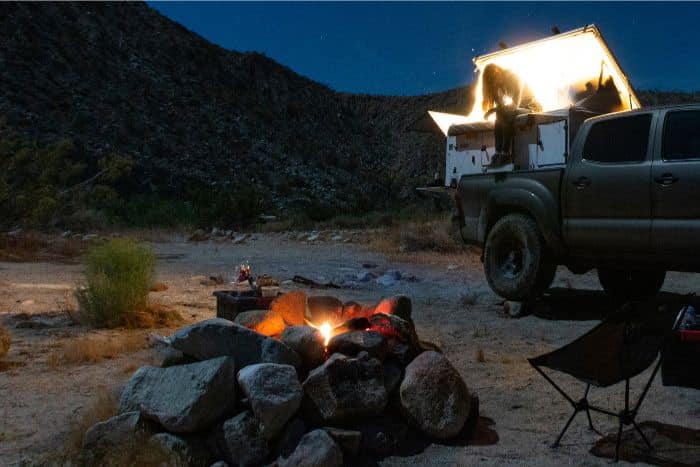
Overlanding safety tip 1: Understanding the African Terrain.
Africa is an immense continent with a vast array of landscapes, from the Sahara Desert’s expansive dunes to the lush rainforests of the Congo.
So getting to know the geography of the regions you plan to visit isn’t just about enjoying the scenery; it’s crucial for your safety. Because after all: who wants to get stuck in the desert without enough water left to survive?
Or on the contrary: stuck in the mud in a jungle with wild animals around? brrrrrr I’d say haha
Overlanding safety tip 2: Avoid conflict zones
Always check the political stability of the areas you’re targeting. Some places, unfortunately, are prone to conflict which can pose a serious risk to travelers. I’d say, keep yourself updated with travel advisories from reliable sources such as your home country’s foreign affairs office or international news outlets.
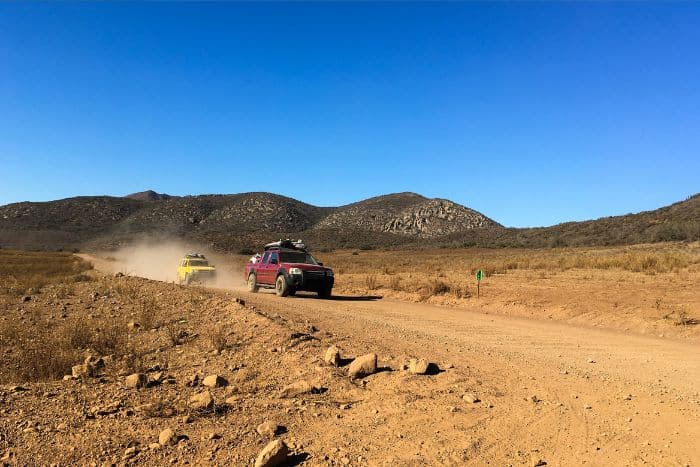
Avoiding conflict zones is a clear move, but you also need to be aware of less obvious risks, like areas with high crime rates or where travelers might not be welcome.
For example, we DID travel to Port St Johns in South Africa, and we were glad to see the reality of this poor region, (and the beauty of the Port!) but oftentimes on the road, we didn’t feel safe at all.
Relying on local intel can be a lifesaver, literally. Talk to people who’ve traveled there recently, join online forums, or connect with local guides before and during your trip.
Overlanding safety tip 3: Protect yourself from robbery!
Here’s a list of tips when overlanding in Africa to protect yourself from crime and theft as much as possible:
Carrying around cash in Africa?
You will need cash to travel around Africa, just for tips alone at gas stations in South Africa, for example, safari guides and rangers, buying souvenirs, etc.
To keep from being robbed of everything you own, you could spread out your cash. Either hide a part somewhere in your overlander (do you have a secret place in yours?) or hide it in several places on your body or luggage or backpack.
There are heaps of tricks and stuff where you can hide cash, from socks with a pocket, to crossbody wallets, extra pockets in clothes, and more. (even in hair ties, belts, fake sunscreen, deodorant, or water bottles with a hidden part!). Expect the unexpected as to where you can hide your cash!

Packs for Women and Men Waterproof Belt Bag Travel Crossbody wallet
Buy Now →
Take copies of your official documents
I always do this, wherever in the world that I am traveling, but doing this in Africa could help you heaps if you ever do get robbed of your official documents, and that is to take copies of each official document that you own: passports, visas, (obligated) vaccination document, insurance documents, drivers license, and credit card (s).
This will save you time and frustration if you end up talking to the local police to get an official document that you were robbed of in the first place, to avoid the frustration of waiting for a new passport or traveling towards another country with your overlander (aaargh the horror if you rented an overlander, only to not be able to pas a border!).
You can place these copies somewhere in your vehicle or in a hidden pocket in your luggage or backpack. Or why not both?
Have an expired credit card in a “dummy wallet”
Get yourself a “dummy wallet” with some cash in it and an expired credit card and put it visible in your pocket or handbag. This can be a distraction for the thief so that he doesn’t look for the ‘real’ things!
Beware of (South African) roadblocks!
Keep an eye out for roadblocks. The first time I noticed this, it was scary as hell! While I didn’t encounter these in countries like Tanzania, we witnessed one in South Africa’s Kwazulu Natal province, on our way to Port St Johns.
We were warned beforehand that this could happen, but because we were warned, we succeeded in staying “cool” (well, a little bit haha), and slaloming around the blocks.
If you can, NEVER STOP, but drive on, especially if there’s a crowd on the road, and keep your doors LOCKED! Even if you would damage something. If you can still drive, drive on!
Sadly, also, fake police checkpoints are a thing, and they can be a real danger. We haven’t encountered any fake ones though, so I can’t really advise you on what to do then, just beware that this can be a possibility.
Overlanding safety tip 4: Check out your trip beforehand and ask locals for the best route.
Understanding the geography of African countries also means recognizing which routes to take. Sometimes the direct route isn’t the safest or most practical one. It’s vital to have detailed, up-to-date maps or GPS, but personal advice from locals can be invaluable and provide you with tips roads don’t show.
Lastly, steer clear of regions that might be isolated or where you would be too remote to get help quickly if needed. Ensuring there’s a feasible exit plan or a reachable form of assistance should always be part of your journey’s logistics.
Overlanding Safety Tip 5: Health on the Road: Preparations and Precautions
Getting your health ducks in a row before hitting the road is absolutely necessary. I’m going to run you through the non-negotiables of health preparation for overlanding in Africa.
Vaccinations are your first line of defense (sorry, no anti-vaccination for me). Do your homework and get the necessary shots. From Yellow Fever to Hepatitis, there’s a whole gamut you’ll either be obligated to have or that can be advisable.
Find a travel clinic for tropical diseases and they’ll set you straight. This also means taking with you some medications like anti-malaria pills (preventive and for treatment of the diseases from the most deadly animals of Africa), painkillers, and your own meds, of course.

Now, as for managing your health while you’re bumping along dirt tracks and savannas, always have a first-aid kit, and even learn some EHBO if you want! Ensure it’s stocked with essentials but don’t overlook things like rehydration salts and desinfectants.
The first time I went overlanding, I even took along a pack of new hypodermic needles, as I was warned that not in every country, hospitals have them for each single person, and trust me, you don’t want to share a needle with someone else (HIV, anyone? 🙁 ).
Medical facilities vary wildly across Africa. Countries like South Africa or Egypt have more advanced healthcare, while remote areas might have very basic services. Doing a bit of research on where you can find reliable treatment along your route is crucial.
You’re going to find out that staying healthy on the road also means drinking clean water, avoiding raw foods in certain areas, and yes, maybe even saying no to that tempting street food.
Also, and this I personally had happen to me: DO NOT GO SWIMMING IN SWEET WATER which contains Schizosoma Mansoni (a parasite), trust me! It is not because locals swim in it, that it is okay for you to do so.
Lastly, travel insurance that covers medical evacuation is a must. Because should the need arise, you want to ensure you can reach a facility that offers appropriate care swiftly.
Overlanding Safety Tip 6: Sociocultural Awareness: Engaging with Local Communities
Meeting the people you meet along the way can help you understand local customs and norms, and it’s a vital part of staying safe. When you overland in Africa, you’re not just a spectator; you’re a guest entering different cultures and traditions.
First off, take the time to learn about the local laws and societal rules. For example, photography laws greatly differ from one place to another; in some areas, taking photos of government buildings or military personnel can land you in hot water.
I remember in Tanzania, locals were quite open to having their pictures taken, while in other places, you might need to ask first or pay a small fee. (it is starting to get usual to ask for a tip to photograph the Masaï, for example)
Respect is key. Whether it means dressing modestly in conservative regions or not indulging in public displays of affection, aligning with local norms can keep you from unwanted attention and demonstrate your respect for the community.
Overlanding Safety Tip 7: Overlanding Vehicle and Supplies Management
Overlanding in Africa, your vehicle is your lifeline. Have a checklist for essential supplies and some must-know vehicle maintenance skills. (more about this later on my blog). Stock up on spare tires, filters, and fluids, plus carrying basic tools and learning how to use them.
Don’t worry too much about becoming a master mechanic overnight. But familiarize yourself with your vehicle’s common issues and quick fixes. Local mechanics can be helpful, yet sometimes you need to handle things on your own.
Inventory management becomes crucial; make it a daily habit to check and organize your gear.
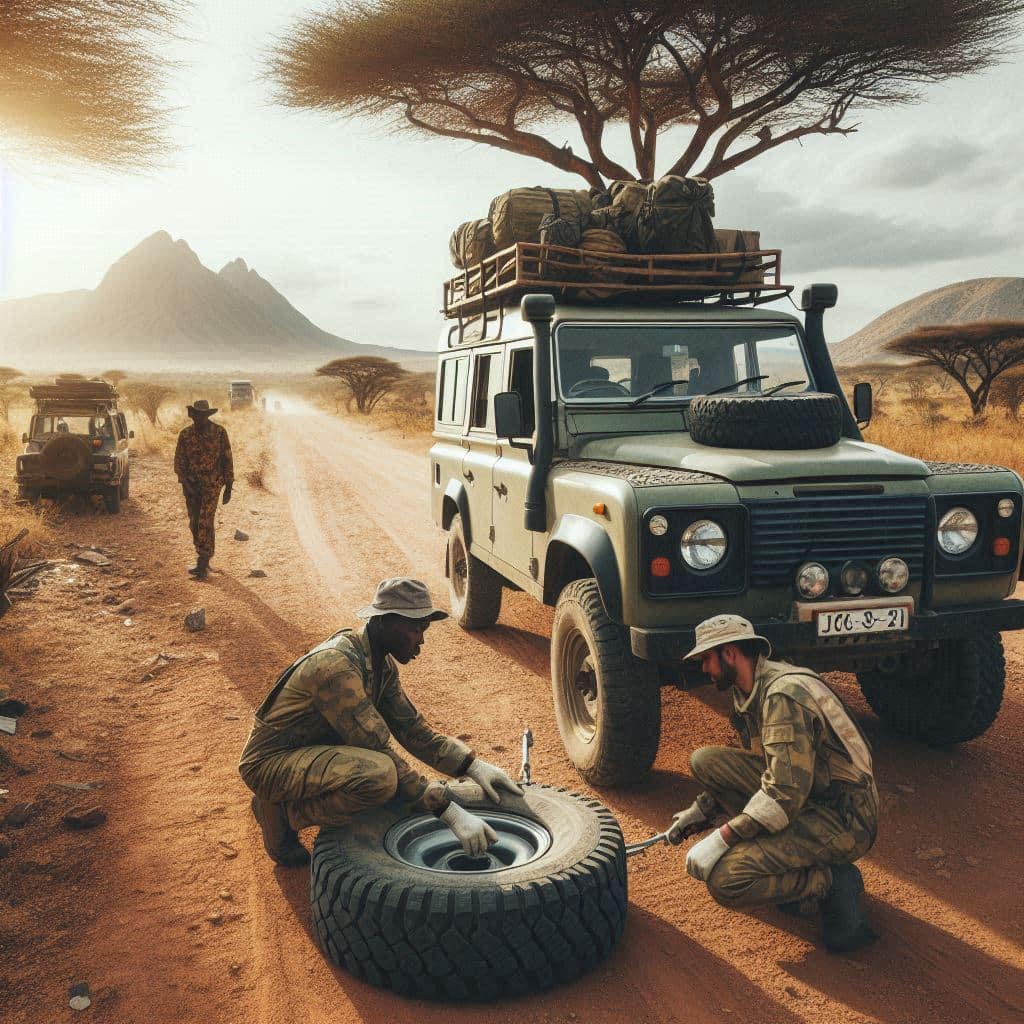
Overlanding Safety Tip 8: Emergency Planning: Stay Connected and Getting Help
When you’re overlanding in Africa, being prepared for emergencies is not just smart; it’s essential.
First up, you want to have satellite phones or GPS devices with SOS functions. In my opinion, it’s non-negotiable. These gadgets are lifelines when you’re miles away from the nearest town.
Another key point is your emergency contact list. Make sure you have local emergency numbers, contacts at embassies, and family or friends back home who can coordinate help if necessary.
Finally, travel insurance is crucial. Choose a policy that covers medical evacuation – it’s a safety net you don’t want to go without.
My final Conclusion: Be safe on Your African Overlanding Adventure!
An overlanding journey across Africa is, without a doubt, an experience of a lifetime. I’ve shared with you crucial insights and personal tips to prioritize your safety, so you can be prepared, but don’t forget to enjoy your journey!
Take these tips not just as advice, but as stepping stones to creating cherished memories!
If you have any more questions on this topic, please feel free to leave them down below in the comment section, or join me on my social media channels below for more pictures, videos and stories of my travels to Africa!
Kind regards,
Lizzy
I now have a YouTube channel as well!
YouTube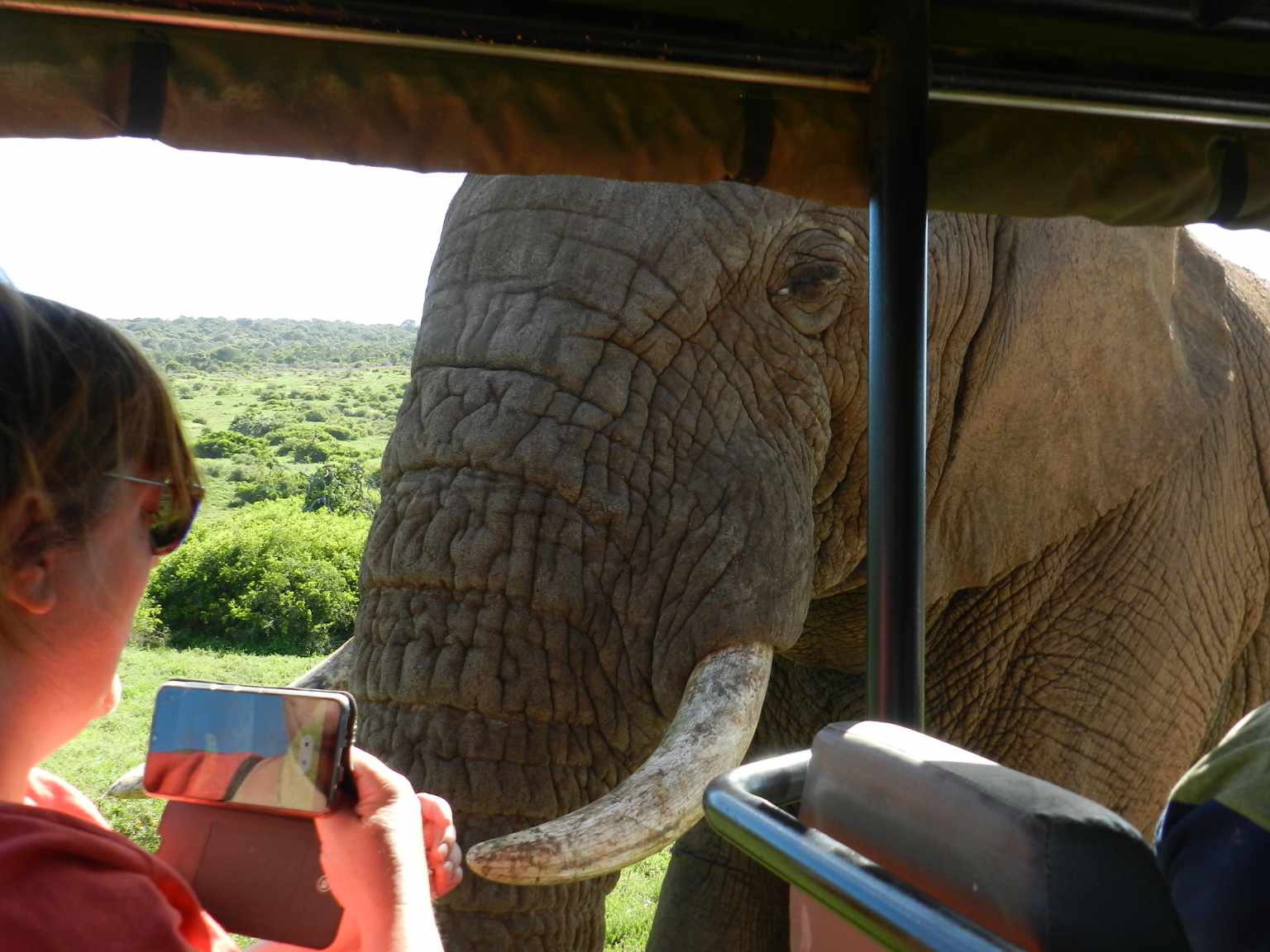
Hello Africa travellers!
Who am I? Well, the least you can say is that I am quite crazy about Africa, its nature, its climate, its culture, and more.
As a young woman in my twenties, I had already traveled to several African countries by traveling along in an overlander on my own and mostly camping ( or glamping ) and just fell in love with the diversity of it all.
So much, so that at the age of 26, I went back to university to study biology, which, unfortunately, I couldn’t finish because of health reasons (yes, I got sick from a tropical disease, oh cynicism). But this did not stop my dream of traveling back to Africa several times, and I still do.
My dream was back then to leave Europe and go study animal behavior, especially the elephants (sure, that’s every girl’s dream haha), but I am also very much intrigued by hyenas and other “ugly African animals“.
So, I “kind of” have a little bit of a scientific approach to my articles, when I write about African birds, for example. And most of all: the passion.
But life goes on, you move from one side of the country to the other, you get sick again and top it off with lower back problems, and before you know it, you are over 50 hahaha!
Now, I still travel to Africa, but take it a bit “easier” than the good old camping days, and stay in comfortable, yet affordable accommodations, together with my husband Wouter.
These are some of the countries I have traveled to: Kenya, Tanzania, Zanzibar, Malawi, Zambia, Zimbabwe, South Africa, Namibia, Botswana, Tunisia, and a little bit of Lesotho LOL .
While clearly not being African territory, but Spanish, I also visited Gran Canaria and Tenerife, and location-wise, I consider them “African”, because of their climate and nature, sue me :-p
The last trip I took was to South Africa in the year 2023, and it sure got the fevers for Africa back! From the Barberton mountains to the Drakensberg and the Southcoast, one month wasn’t enough at all to see the whole country, so we’ll be back! At ease and with a little bit more luxury than in my younger days haha!
I wish you happy travels!
Kind regards
Lizzy

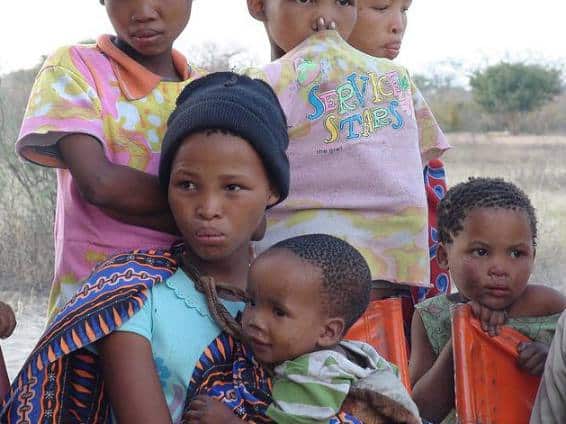
Hi Lizzy – this was great information for safety for overlanding in Africa – or really any unfamiliar continent. I have never been to Africa, but I would love to go some time. Do you recommend going with a tour group for your first time to Africa?
I have an old friend that is a wanderer. He goes to remote areas and helps communities. He is very savvy in what he does.
I liked your recommendations about protecting the money. I have traveled to Mexico with a group and learned how to protect our money there. Some places in Mexico aren’t very safe either!
Thanks for this great read!
– Scott
Hello Scott!
You really should go to Africa if you can one day, and yes traveling in a group would be best if you are going the first time I think!
Because going on safari is something else, you need to consider a bunch of things for your safety, hence this blog post, and a guide can help you more with those things 😉
You are welcome and thank you for your comment!
Lizzy
Thanks, Lizzy. This is a great read. The excitement and danger come through what you write tangibly. You are the archetypal intrepid traveller! Bravo.
I’ve done quite a lot of long-term travel—I carried a backpack around 46 countries for two years some years ago! So, I can tell you know what you’re talking about with these safety tips.
Btw, How long do your trips last?
Regarding Africa, I have only travelled in North Africa, but I did have some hairy moments there. Tunisia is excellent, but if you’re a female, the men are sex-starved and manipulative!
Question: Have you ever had any brushes with religious fanatics or tribespeople there? And I guess you’ve read Karen Von Blixen’s Out of Africa? The film is beautiful, but it has nothing to do with the book, really.
It’s a great idea to narrow down your niche to Africa only! Drilling down is much better than spreading yourself thinly.
Blessings and Success.
Linden
PS: I’m saving safari-land for a long stay – 6 months would be good.
Hi Linden!
It looks like you have traveled even more than me haha, 46 countries wow! (come to think about it, I think I have actually seen about 35 countries worldwide).
I know about Tunisia and the guys there that can be very pushy towards women, sadly. The same happened when I went to Istanbul with a female friend, we hardly could leave the hotel at night. So yes, that can be an issue.
However, in most other countries in Africa, women actually travel a lot by themselves, although they mostly like me, joined an overlander group. I would still advise anyone to do this though, especially females.
Ah yes, the book from Karen Von Blixen is terrific, adored it and agree: the film was different, as usual haha!
Wow, 6 months, I’m jealous! The most longest trips I have done were always about a month-long, in between I had to work, sadly haha!
Thanks for your wonderful comment and I wish you a great time on your safari!
Lizzy